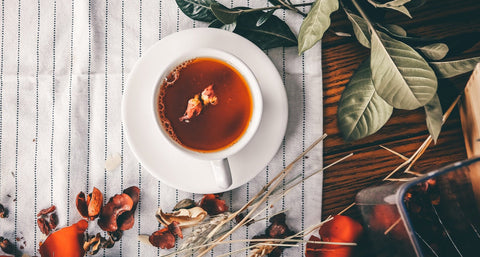Nourishment for joints, muscles, detoxification and relaxation
Collagen can reduce pain, calm the nervous system, shorten recovery time after exercise and facilitate the healing of injuries.
What is collagen?
Collagen consists of several different amino acids, largely glycine. It is a substance produced by the body itself. Collagen also contains i.a. the amino acids proline, arginine, glutamine and minerals. Our body's various tissues are made up of a large amount of collagen. It builds up i.a. skin, hair and nails, cartilage, tendons, the bone structure of our skeleton and connective tissue.
Vitamin C is also needed to build collagen.
How do we get - and did we get - collagen?
Collagen was normally included in food in the past to a greater extent than now, when we eat mostly muscle meat or are vegetarians. Before the era of modern fast food, when food was prepared from scratch with local ingredients, every part was taken care of when hunting, fishing or butchering. When chicken or fish meat was cooked, leftover bones and carcasses were boiled into broth and soups. Gentle slow boiling releases important minerals and amino acids from the collagen, which is particularly abundant in articular cartilage, e.g. in chicken wings. The broth then contains minerals and amino acids in an easily absorbable form.
Therapeutic benefits of collagen
- Detoxification
- Calming the nervous system
- Healing
Although the body can produce glycine itself from the protein we eat, an intake of ready-made glycine seems to be beneficial for various pain conditions and injuries. Glycine also acts as a neurotransmitter in the nervous system and has a dampening effect on nerve signals, which upregulates the parasympathetic – calm and rest – system. After operations, in case of inflamed and damaged intestines (leaky gut) or other injuries, the body uses the amino acids in collagen for the healing process.
In the body's detoxification system, the body can use glycine to bind toxic substances and waste products, which can then be more easily removed via the liver. When the nervous system is in parasympathetic mode, detoxification works and tissues heal, all inflammation in the body subsides. It is experienced as reduced pain, calmer mind, better sleep and in turn facilitates continued healing and detoxification in a positive spiral.
Intake of collagen in connection with pain, injuries and training
- increased muscle mass after exercise
- increased muscle strength
- reduced pain, faster recovery
There have been many scientific studies on collagen, both for humans and animals. They show faster recovery and reduced soreness and pain in the muscles. It has been shown to reduce pain both in healthy active individuals and in people with inflammatory symptoms such as e.g. osteoarthritis. Collagen synthesis (included in the formation of cartilage and tendons) is also positively affected in studies on people with injuries.
If you don't cook broth yourself, freeze-dried collagen is available as an easily soluble, tasteless powder that can easily be mixed, e.g. in a smoothie or other drink.
Sources:
https://pubmed.ncbi.nlm.nih.gov/26822714/
https://www.ncbi.nlm.nih.gov/pmc/articles/PMC6566884/
https://www.ncbi.nlm.nih.gov/pmc/articles/PMC5950747/
https://stud.epsilon.slu.se/10566/7/ernback_m_170816.pdf




